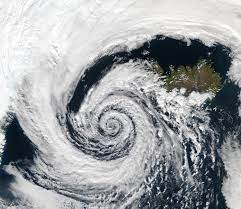A cyclone is a weather system characterized by strong winds rotating around a center of low atmospheric pressure. Cyclones are among the most powerful and destructive weather phenomena on the planet, capable of causing significant damage to property and loss of life.

Table of Contents
Formation
Cyclones are formed in areas of warm water, typically in the tropical regions of the world. As the warm air rises, it creates a low-pressure system, which in turn causes the air to rush in from all directions, creating a spinning effect. The spinning of the air causes the formation of a rotating cloud system, which can eventually turn into a tropical storm or a hurricane, depending on its intensity and wind speed.
Impacts of Cyclone
Cyclones can have devastating effects on people and property, with the potential to cause massive damage to infrastructure, homes, and businesses. Cyclones can also cause flooding, landslides, and other natural disasters that can displace people and disrupt local economies.
Preparation and Response
Preparing for cyclones involves taking measures to protect lives and property in advance of the storm. This includes creating emergency response plans, securing loose objects that could become flying debris, and ensuring that evacuation plans are in place. After a cyclone has hit, the response efforts focus on assessing the damage and providing aid to affected communities, including access to shelter, clean water, and medical assistance.
Cyclone in India
India is prone to natural disasters, including cyclones, which can cause widespread devastation in the country. With a long coastline along the Bay of Bengal and the Arabian Sea, India is particularly vulnerable to cyclones, which can cause extensive damage to infrastructure and property, and even loss of life.
In conclusion, cyclones are powerful weather systems that require careful attention and preparation. Understanding the formation and impact of cyclones is essential for creating effective response plans and minimizing the risk of damage to property and loss of life. By staying informed and taking the necessary precautions, communities can better prepare for the potential impact of these natural disasters.
Important Links